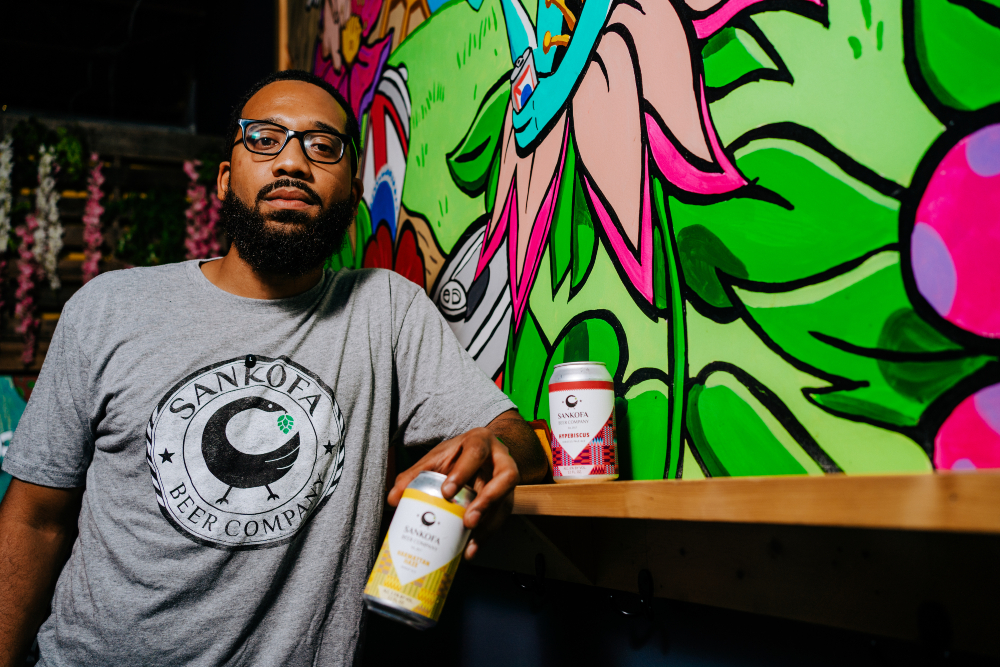Meet a Brewer: Kofi Meroe of Sankofa Beer Company (Washington, DC)

Kofi Meroe is a co-founder of Sankofa Beer Company, a Washington, DC-based producer and distributor of premium craft beer. Established in 2017, the foundation for Sankofa Beer Company was inspired by Kofi’s – and his co-founder, Amado Casky’s – upbringing in West Africa.
How did you get your start in the craft beer industry?
My business partner and cousin, Amado, and I were homebrewers for about eight or nine years before we decided to start the company. Midway through our homebrewing journey, we got really interested in experimenting with ingredients from back home – home being West Africa, between Nigeria and Ghana. A small brewery in D.C. gave us the opportunity to brew one of our batches on their system and put it on their taps, and that was the birth of Sankofa Beer Company. We wanted to create a craft beer company that pushed the boundaries of what you can do with European-American styles of craft beer, influenced by our upbringing in Africa.
We’re still a contract brewery — and we only distribute in the D.C. area at the moment — but I’m looking to grow in the future. We definitely like to do collaborations, and typically, if you find our beer outside in the D.C. area, it’s because we collaborated with another brewer.
Have you encountered any issues or difficulties expanding into new markets?
When you think about the size of our operations, we’re only doing about 100 barrels – if that, some years – meaning we’re still pretty small. We’re self-distributing at the moment, so we are currently looking for potential distributor relationships where we could get both local expansion, as well as expansion to states like Maryland and Virginia, or major markets like New York and Atlanta. For a business of our size, it’s difficult because we want distributors with a certain reach, but those sorts of distributors don’t tend to give us much thought. I don’t have a large marketing budget to throw at them, so it can be difficult to align on the things that we’re looking for to grow the business. Access to capital can also be a challenge, because it’s not free to expand, but you must be able to put the infrastructure in place behind your expansion plans.
How has Sankofa mitigated the effects of record inflation and supply chain disruptions?
Our three flagship beers – a hibiscus pale ale, wheat ale and a chocolate milk stout – are pretty niche, so I find there’s always room in the market for something we’re selling. However, input costs have skyrocketed over the last two to three years. That’s really tough, because we’re not brewing at such a scale where we can easily absorb those sorts of costs. When supply chain issues were really bad in 2020 and 2021, it was challenging to get access to certain cans, hops and grains. Because we’re self-distributing, I’m not carrying five beers at a time, so it forces us to be very intentional about the types of beers we brew. It can even come down to recipe manipulation – trying to find ways to streamline and simplify our recipes. While we haven’t done too much of that yet, these are the sort of decisions we’ve had to make over the last two to three years.
What would you like D.C.’s lawmakers to know about the effect of increased excise taxes on your business?
As a business owner moving through the supply chain, you’re taking punches here and there – and by punches, I mean anything that takes away from your bottom line. When it comes to excise taxes, that’s like the last punch after you’ve already had to overcome multiple other hurdles to get from production to sale. Excise taxes are something that lawmakers really need to take a look at. I’ve lived in D.C. for a very long time, and there is always talk about how small businesses are the lifeblood of the city. D.C. does provide great support on the front end for businesses, but when it comes to excise tax policies, I don’t see that follow through and the same level of exceptions that are being made to bolster small businesses.
Excise taxes are big for us. We’re already dealing with inflation and a lot of other issues that are increasing the cost of our business and decreasing our margins. It’s difficult for us to continue to hear conversations about increasing excise taxes. Because we don’t control our own production, our volume is kept to a certain extent, and additional costs make it hard for us to make money. It also makes it challenging for new folks to break into the business. As we look at taxes, we need to look at the rest of the value chain to figure out how costs have gone up or down in other areas, and evaluate how a potential tax change would impact other challenges folks are facing.
What advice do you have for those just starting out in the industry?
This goes without saying, but it’s critical to understand the laws. Liquor laws are very confusing – sometimes I wonder if they were intentionally written that way. From the federal to the state level, these laws can be vague, so having the right person to help you navigate the legal environment is critical because it can save you a lot of time. It’s really important to understand the laws before you start to make any decisions about operating in a market.
What’s your favorite part about working in the craft beer space?
For me, it’s seeing people enjoy the product. I come from a background of hospitality, and the same thing that drove me there is what drives me here: you put all this time and effort into creating something, and you want people to enjoy it. It’s really that simple.
